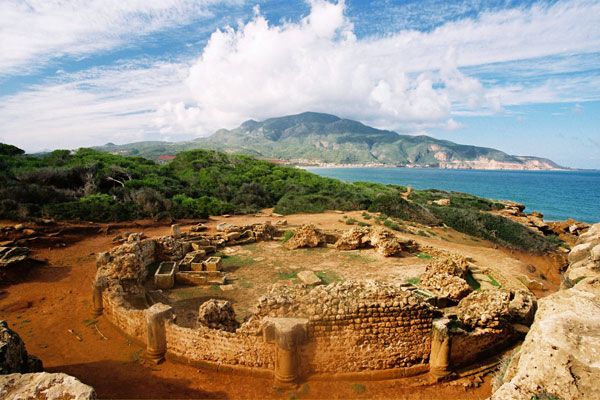Tipaza is an ancient Berber and Roman city located on the Mediterranean coast in northern Algeria. The city was founded by the Phoenicians in the 6th century BCE, but was later conquered and occupied by the Romans in 46 BCE.
During the Roman era, Tipaza was an important port city and served as a trading center for goods such as olive oil, wheat, and wild animals from the surrounding region. The city also became an important center of Christianity, with several churches and a bishopric established there in the 4th century CE.In the 5th century CE, Tipaza was sacked by the Vandals and fell into decline. The city was later occupied by the Arabs in the 7th century CE and eventually became part of the Ottoman Empire.Today, Tipaza is a UNESCO World Heritage site and is home to several ancient ruins and monuments. The most famous of these is the Roman Theater of Tipaza, which was built in the 2nd century CE and could seat up to 3,000 spectators. Other notable ruins include the Basilica of Saint Salsa, the Temple of Neptune, and the Tomb of the Christian.Tipaza is also known for its beautiful coastline and beaches, as well as its stunning natural scenery. It remains an important cultural and historical site in Algeria and draws visitors from around the world who come to explore its ancient ruins and enjoy its natural beauty.
Tipaza has a long and complex history that stretches back over two thousand years. Here are some additional details about the city's past:
Phoenician Settlement: Tipaza was originally founded by the Phoenicians in the 6th century BCE. The city served as an important center of trade and commerce, with goods passing through its busy port from all over the Mediterranean region.
Roman Occupation: In 46 BCE, Tipaza was conquered by Julius Caesar and became a Roman colony. The city flourished under Roman rule and grew in size and importance. Many impressive public buildings and monuments were constructed during this time, including the Roman Theater, the Temple of Neptune, and the Basilica of Saint Salsa.
Christian Center: In the 4th century CE, Christianity became the dominant religion in the Roman Empire, and Tipaza was no exception. The city became an important center of Christianity, with several churches and a bishopric established there. Saint Salsa, the patron saint of Tipaza, was a young Christian woman who was martyred during the reign of the Roman Emperor Diocletian.
Vandal Invasion: In the 5th century CE, the Vandals, a Germanic tribe, invaded North Africa and sacked many of the cities along the coast. Tipaza was one of the cities that fell to the Vandals, and it was badly damaged during the invasion.
Arab Conquest: In the 7th century CE, the Arab armies of Islam conquered North Africa and brought the region under Muslim rule. Tipaza was occupied by the Arabs and became part of the Islamic caliphate.
Ottoman Empire: In the 16th century CE, Tipaza was taken over by the Ottoman Turks, who ruled the region for several centuries. During this time, many of the ancient ruins were used as a source of building materials for the construction of new buildings.
French Colonization: In the 19th century CE, Algeria became a French colony, and Tipaza was incorporated into the French colonial empire. The French restored many of the ancient ruins and began to promote Tipaza as a tourist destination.
Independence: In 1962, Algeria gained its independence from France, and Tipaza became part of the newly formed Algerian state. Today, the city is a popular tourist destination and a UNESCO World Heritage site. Visitors come to explore the ancient ruins, enjoy the beautiful beaches and coastline, and experience the unique blend of Berber, Roman, and Islamic cultures that make Tipaza such a fascinating place.





0 Comments